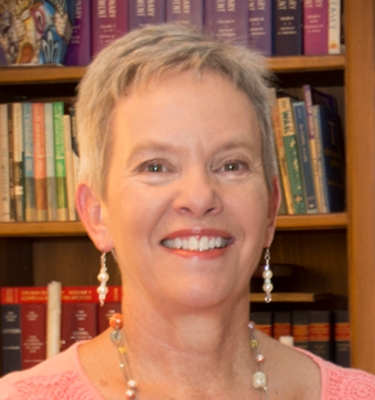An online social science degree may be your first step toward an interesting and rewarding career in the social science field of your choice.

Degrees in social science include anthropology, history, liberal arts, political science, psychology, sociology, and social work.
Editorial Listing ShortCode:
These versatile degrees allow you to study multiple academic subjects. They can lead to an array of jobs in government, business, industry, NGOs, public service, and nonprofit organizations.
Online Social Science Degrees
A social sciences degree may be in one of several academic fields. Courses in social sciences degree programs require significant amounts of reading, research, data analysis, writing, communication skill, and critical thinking.
Select the program that most interests you to jump to that section of the guide:
Regardless of the specialty you select, you will still receive a strong foundation in social science and related courses.
Anthropology

Anthropology is the study of multiple aspects of human life around the world, including how humans evolved and how we live together in societies.
Archeology is a subdiscipline that involves analyzing the objects that people have made in the past. Biological anthropology focuses on how humans adapt to environments around the world.
Editorial Listing ShortCode:
Another focus area is sociocultural anthropology, which is the study of how people interact with each other in diverse cultures and societies. On the other hand, linguistic anthropology is the study of how people communicate with each other all around the world, in past and present times.
History

If you major in history, you may enter a degree program that is rich in opportunities for reading, researching, and writing.
You may acquire and apply broad knowledge to describe and explain historical periods, movements, and events. You may also analyze the actions of key figures who influenced the course of history.
Editorial Listing ShortCode:
A history degree program emphasizes research and analysis of historical sources. You may learn to conduct primary and secondary research that yields facts on which you can base logical and illuminating historical arguments in written form.
Through your research and writing assignments, you may increase your ability to engage in critical and analytical thinking. These skills especially benefit history majors who continue on to law school and future careers in the legal profession.
Liberal Arts

A liberal arts degree program provides opportunities to study a broad array of subjects, including history, English literature, philosophy, and languages. You may also take courses in other social science disciplines, such as sociology, economics, and psychology.
Because liberal arts degree programs are versatile and flexible, they often allow you to tailor your coursework to your interests.
Editorial Listing ShortCode:
After fulfilling the core requirements, you may want to focus more heavily on literature, humanities, and the arts. You might also choose to turn your focus toward subjects such as political science, sociology, or psychology.
Political Science

If you major in political science, you’ll likely have opportunities to study how domestic and foreign governments operate, how political power is acquired and used, and how public policy is formulated and applied to affect the lives of citizens.
Courses in this major focus on enhancing your abilities to engage in research, data analysis, writing, communicating, and critical thinking as well as public speaking and debate.
Editorial Listing ShortCode:
In a political science degree program, you might focus on domestic government and public policy issues. Alternatively, you may elect to study international relationships between countries around the world.
Psychology

Psychology is the study of human behavior and how the human mind works. With a degree in psychology, you may position yourself for a career in healthcare, mental health support, counseling, or social work.
Editorial Listing ShortCode:
As a psychology major in a bachelor’s degree program, you may lay the groundwork for graduate studies that may lead to a career as a counselor or psychologist. The research and critical thinking skills that you may build as a psychology major might lead you to a career in business or industry.
Sociology

If you’re fascinated by how people interact and relate to each other in societies and cultures around the world, then you might want to major in sociology.
It’s a wide-ranging field that involves learning about human relationships in large and small societal contexts. For example, you may study a large-scope topic like global migration, or you may focus on a small-scope topic like family relationships.
Editorial Listing ShortCode:
In sociology courses, you may learn to explore and explain multiple issues that affect the lives of people in society. These issues include racial and gender identities, urban and rural societies, criminal and justice systems, wealth and poverty, and more.
Social Work

Although most bachelors degrees are a Bachelor of Arts (BA) or a Bachelor of Science (BS), a degree in social work can be a Bachelor of Social Work (BSW). It is a specific, skills-based degree that prepares you to become a social worker.
One of the distinguishing features of a BSW is its focus on field experiences, allowing social work majors to apply their knowledge in real-world situations. In addition to field placements, social work majors take courses where they acquire the values, knowledge, and code of ethics necessary to enter the profession.
Editorial Listing ShortCode:
The BSW degree may lead to jobs in child and family service agencies, mental health clinics, or public policy decision-making.
Social Science Careers & Salaries
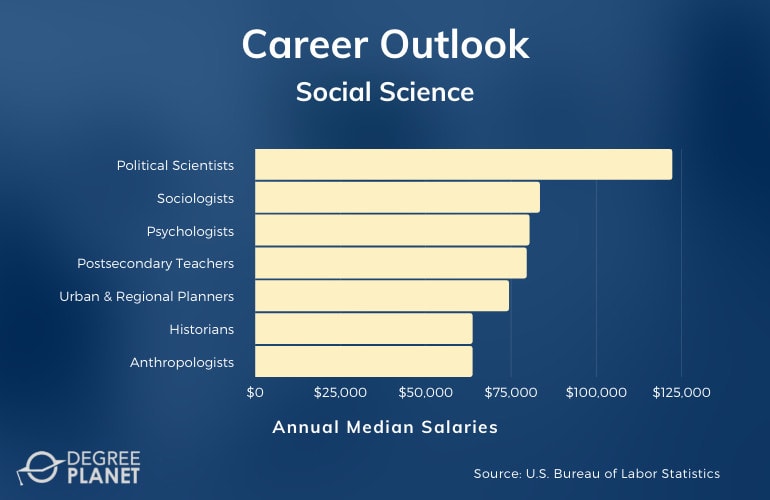
Social science majors can go on to pursue a broad array of careers in business, education, government, industry, and healthcare. You may pursue a job in nonprofit, for-profit, and governmental organizations in the public and private sectors.
According the Bureau of Labor Statistics, many social science careers require at least a masters degree. If you have you sights set on one of these specialized professions, a bachelors in social sciences can act as a foundational stepping stone toward a higher degree.
| Careers | Annual Median Salaries |
| Political Scientists | $125,350 |
| Sociologists | $86,110 |
| Psychologists | $82,180 |
| Postsecondary Teachers | $80,790 |
| Urban and Regional Planners | $75,950 |
| Anthropologists and Archaeologists | $66,130 |
| Historians | $63,100 |
| High School Teachers | $62,870 |
| Survey Researchers | $59,870 |
| Archivists, Curators, and Museum Workers | $52,140 |
The Bureau of Labor Statistics reports an average growth rate of 5% for life, physical, and social science occupations through the next decade. This is above the national average.
Social Science Curriculum & Courses

The category of social science is applied to several academic disciplines and career fields. The following list describes some of the basic, introductory courses that you might take in a bachelor’s in social sciences program.
- Introduction to Anthropology and Archaeology: You’ll explore the evolution of humans from pre-history through the rise of modern social structures, with attention to analysis of fossils and material evidence of worldwide cultures.
- Ancient World History: You’ll develop an understanding of human history in disparate cultures around the world, from its origins up to the Renaissance period.
- Introduction to American History: You’ll discover the complex relationships between Native American, western European, and African cultures as these societal groups interacted throughout the history of North America.
- Introduction to American Government: This course is a survey of the political and governmental institutions and processes of the American system of government.
- General Psychology: This course is an introduction to the terms, basic facts, and principles on which the study of the human mind and behavior is based.
- Introduction to Sociology: You’ll explore the introductory concepts, theories, and research methods that are used to study how humans interact and behave at all levels of society.
- Western Civilization to 1700: This course surveys the political, cultural, and socioeconomic developments in Greece, Rome, and emerging western European nations from pre-history to 1700.
- Introduction to Humanities: You’ll explore a variety of creative works of music, visual art, philosophy, and literature to develop an understanding of cultural value and meaning.
- Introduction to Social Work: This course explores the profession of social work, including its history and present-day principles, focusing on how social workers positively affect the wellbeing of people and communities.
- Introduction to Liberal Arts Education: You’ll develop skills in critical thinking, writing, research methods, speech, and technology for research and communication.
Depending on the social science major that you choose, you might be required to take one or more of these courses in your degree program.
Admissions Requirements

The first step on your educational journey will be to apply for admission to the college or colleges of your choice. Here is an overview of basic admission requirements.
- High school diploma or equivalent
- Minimum high school GPA
- Minimum scores on SAT or ACT tests, if required
Each college or university sets its own minimum GPA requirement. Additionally, some schools require minimum scores on standardized tests while others no longer require test scores.
Editorial Listing ShortCode:
If your GPA or test scores are not high enough for admission to a particular school, many institutions offer remedial scholar programs to help you get ready for college-level academic work.
Accreditation
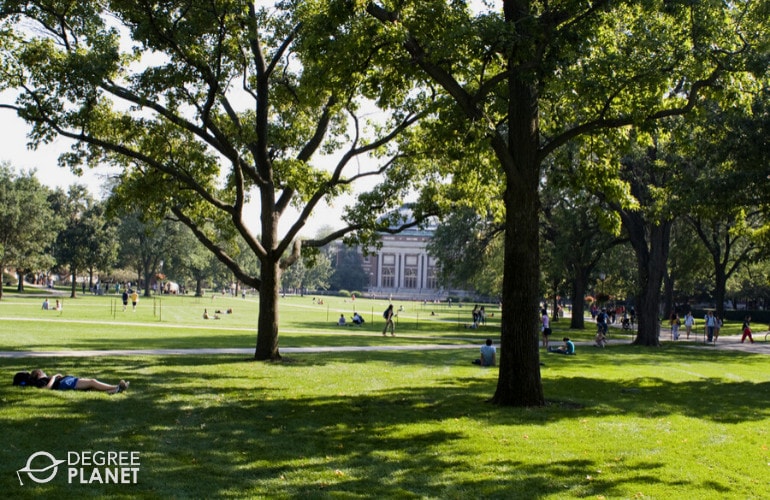
After you complete your bachelors degree, it will serve as evidence of your knowledge and skill in the social science field of your choice. Your degree can be influential when you apply for jobs or for graduate school admission.
Some employers and institutions do not acknowledge unaccredited degrees. For these reasons, it’s important to earn your degree from an accredited college or university. Selecting a school that is accredited by a regional accrediting organization ensures that you’re receiving a high quality education.
Financial Aid and Scholarships

To seek help for financing your college expenses, you can visit the Federal Student Aid website. You can start the process by filling out and submitting your FAFSA form. This is a required step to get the ball rolling for financial assistance.
While you’re on the Federal Student Aid website, you may also check out the many types of financial aid that are available for qualifying college students. These options include need-based and merit-based scholarships, work-study programs, loans, grants, and assistance for active-duty military, veterans, and military family members.
You might seek financial aid from other sources as well. The Department of Education in your state may offer scholarships. Community civic organizations, alumni groups, employers, and churches also tend to give scholarships.
Your high school guidance counselor might even be able to provide information about scholarship opportunities in your local community.
What Can You Do with a Social Science Degree?

With a bachelors degree in a social science field, you may step into an entry-level career as an archivist, museum curator, survey researcher, high school teacher, or social worker.
If you build on your social science bachelors degree by completing your masters degree, you might pursue a career as a sociologist, psychologist, historian, or anthropologist. These are only a few of the career paths in social science fields.
The research and communication skills that you may develop in your bachelors program might serve you well in careers such as banking, human resources, and public policy administration. Critical and analytical thinking skills along with capabilities in speech and debate might prepare you for law school as well.
How Long Does It Take to Get a Degree in Social Science Online?

Getting your degree online allows you the freedom and flexibility to do your schoolwork from home, working around any work and family responsibilities.
The amount of time it takes to complete your degree can depend on whether you enroll in classes on a full-time or part-time basis. A typical bachelor’s degree program is designed to be completed in 4 years if you attend full-time with a traditional, 16 week semester.
If you enroll full-time and year-round in a degree program that offers 8 week semesters, you might be able to shorten the time until graduation.
If you still need a shorter amount of time, then a traditional or online associates degree in social science may be the best choice as it requires half the credits as a bachelors degree.
What Is a Social Science Major?

A social science major is an academic degree track that involves the study of human history, society, institutions, behavior, and relationships.
Social science disciplines include anthropology, geography, history, liberal arts, political science, psychology, sociology, gender studies, women’s studies, and ethnic studies. If you major in one of the social sciences, you’ll likely take some courses from other social sciences during your degree program.
Editorial Listing ShortCode:
You’ll likely focus on one concentration area to develop knowledge and skill in a specific discipline as you prepare for graduate school or for a career in your chosen field.
What Is the Difference Between Social Work vs. Social Science?

Social work is a specific profession in which practitioners apply knowledge and skills related to the field of sociology to assist individuals, families, and communities in need of help.
Social workers must often complete at least a Bachelor of Social Work degree, and many hold the master’s level degree. By comparison, a degree in social science may be in any of several academic disciplines. These academic areas include history, political science, sociology, anthropology and archeology, and psychology.
While social work is considered a social science, the term social science has a much broader meaning.
What Is the Difference Between a Bachelor’s in Sociology vs. Social Science?

A bachelors degree in sociology focuses on the study and research of human behavior in social contexts.
In a sociology degree program, you may learn to use research methods and data analysis to investigate how people relate to each other in both large and small social environments.
While sociology is a social science, the term social science is a broader, multi-disciplinary term that can be applied to several subject areas. These include anthropology and archeology, history, geography, political science, and psychology.
What Is the Difference Between a Bachelor’s in Humanities vs. Social Science?

The humanities and the social sciences share many similarities, and the overlap between these two general academic fields can be confusing.
Humanities courses involve the study of human cultures, and social science courses take a scientific approach to the study of human society and human behavior. Courses in a humanities degree program might include literature, languages, religion, philosophy, and appreciation of the visual and performing arts.
In contrast, social science courses include anthropology, archaeology, history, political science, geography, economics, psychology, sociology, and social work. There is often an overlapping of these courses in humanities and social science degree programs.
What Is the Difference Between a BA in Social Science vs. BS in Social Science?

In the social sciences, you may opt for a Bachelor of Arts degree or a Bachelor of Science degree. The degree programs are similar, but a BA degree program focuses more on humanities and language courses.
A BS degree will require more math and science-based courses. In social science fields, both BA and BS degree programs are available in history, geography, anthropology and archeology, political science, psychology, and sociology.
Is a Social Science Degree Worth It?
Yes, a social science degree is worth it for many students. The Bureau of Labor Statistics is projecting 5% job growth in life, physical, and social science occupations over the next 10 years.
Editorial Listing ShortCode:
Common social science careers in this field include anthropologist, archaeologist, historian, political scientist, sociologist, and psychologist. Many social science careers require a masters degree, but a bachelor’s degree in a social science field may position you for graduate studies or law school.
Universities Offering Online Bachelor’s in Social Science Degree Programs
Methodology: The following school list is in alphabetical order. To be included, a college or university must be regionally accredited and offer degree programs online or in a hybrid format.

Although the Bachelor of Arts in Social Science program at Adelphi University includes two concentrations, students pursuing the degree online must enroll in the general track. The school accepts transfer credits, prior learning credits, and life experience credits, which can significantly lower the number of courses students must take.
Adelphi is accredited by the Middle States Commission on Higher Education.

Students enrolled in the Bachelor of Science in Behavioral Science program at Bellevue University will learn about how and why people build relationships, the intricacies of complex family dynamics, and the underlying causes of substance abuse.
The curriculum pulls courses from psychology, human services, sociology, human diversity, and ethics disciplines.
Bellevue University is accredited by the Higher Learning Commission.

Students in California State University – Chico’s social science bachelors program can choose between the general multidisciplinary option or the specialization option.
The general option provides them with a comprehensive overview and prepares them for the CSET exam. The specialization option allows them to focus specifically on career and life planning or sociology.
CSU – Chico is accredited by the WASC Senior College and University Commission.

Although Excelsior College allows students in its Bachelor of Science in Social Sciences program to transfer up to 113 of the required 120 credits, most students only transfer, on average, about 64. Students can choose to pursue the standard degree, or they can add an optional concentration in human services.
Excelsior College is accredited by the Middle States Commission on Higher Education.

Franklin University’s Bachelor of Science in Social Science program helps students become creative critical thinkers, cooperative team players, and highly effective communicators.
They should also learn to conduct their own personal research and apply the research of others to understanding and developing solutions to a wide variety of societal issues.
Franklin University is accredited by the Higher Learning Commission.
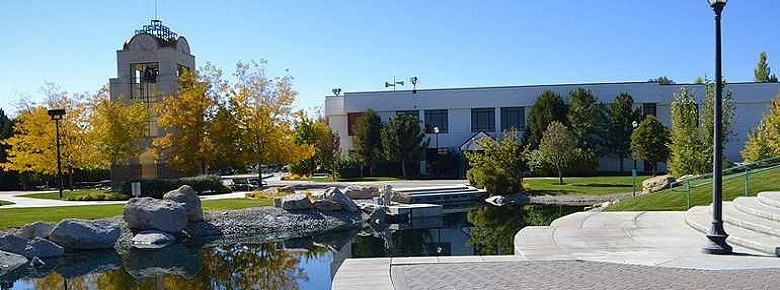
All courses in the social science bachelors program at Great Basin College can be completed online, including the final capstone class required for graduation.
The curriculum includes classes from a variety of disciplines, including psychology, history, political science, and anthropology. Graduates often pursue jobs within nonprofits, education, or the government.
Great Basin College is accredited by the Northwest Commission on Colleges and Universities.

Students pursuing their social science bachelors degree from Kansas State University can customize their curricula by choosing to focus their elective courses on up to four of the program’s nine concentrations.
The choices include gender, women and sexuality studies, political science, sociology, anthropology, mass communications, psychology, history, geography, and economics.
Kansas State University is accredited by the Higher Learning Commission.

New York University’s Bachelor of Arts in Social Sciences program provides sturdy foundations for students who plan to continue on to graduate school or pursue careers in fields like social services, law, global affairs, or behavioral sciences.
Popular courses include Judaism, Christianity and Islam, understanding media, the historical imagination, and criminology.
New York University is accredited by the Middle States Commission on Higher Education.
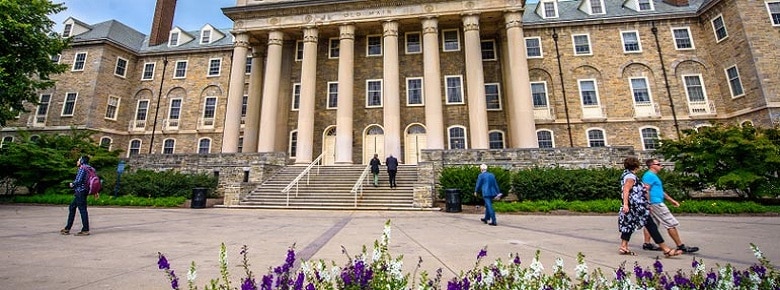
The Bachelor of Science in Integrated Social Sciences program from Pennsylvania State University is a comprehensive program that pulls courses from various disciplines, including communication arts and sciences, anthropology, political science, and other core social science fields.
Courses cover topics like conducting research, communicating effectively, history, the humanities, and ethics.
Pennsylvania State University is accredited by the Middle States Commission on Higher Education.
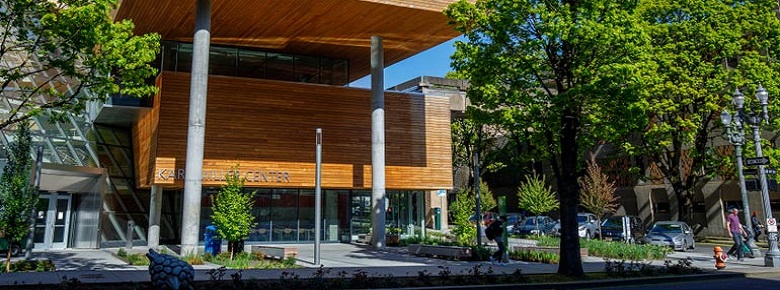
Portland State University offers online Bachelor of Arts and Bachelor of Science degrees in social sciences. They both require 180 credits for completion, and many courses in both overlap and are taught by the same professors. The BA puts more emphasis on the humanities while the BS is more STEM-oriented.
Portland State University is accredited by the Northwest Commission on Colleges and Universities.

Roger Williams University’s Bachelor of Science in Social Science program is a good option for students hoping to pursue careers in fields such as business, marketing, education, administration, social work, or politics.
Heavy emphasis is placed on liberal arts courses and cultivating problem-solving, critical thinking, communication, analytical, and writing skills.
Roger Williams University is accredited by the New England Commission of Higher Education.
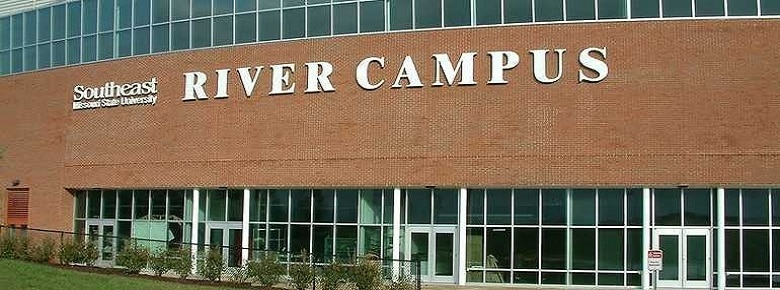
The Bachelor of Arts in Social Science program from Southeast Missouri State University is fully online and includes six concentration options. Students will select one concentration as their major and one as their minor. They can also choose between 4 week, 8 week, or 16 week course lengths to suit their learning needs.
Southeast Missouri State University is accredited by the Higher Learning Commission.
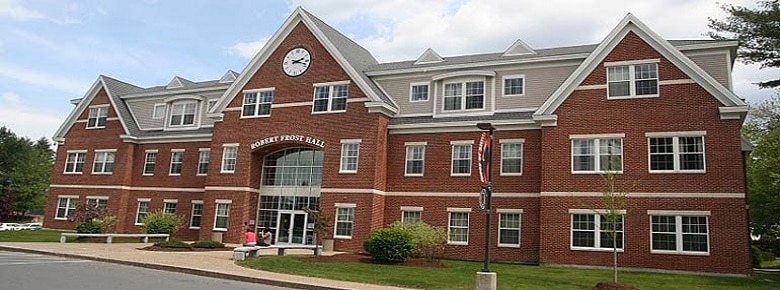
Students at Southern New Hampshire University have many options when it comes to earning online social science degrees.
Without counting the on-campus programs, there are ten online bachelors programs, six online masters in social science programs, an online associates program, and an online certificate program. Most programs have additional concentration options as well.
Southern New Hampshire University is accredited by the New England Commission of Higher Education.

SUNY Empire State College offers social science degrees at both the associates and bachelors levels.
Within these programs, students can also select from five concentration areas in either political science, public policy, women’s studies, social theory, or sociology. Additionally, students can choose to customize their curricula with multidisciplinary studies.
SUNY Empire State College is accredited by the Middle States Commission on Higher Education.
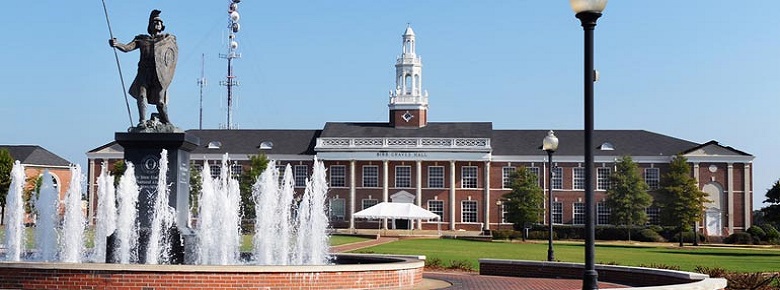
Troy University’s social science bachelors program features many options for students interested in the field. In addition to multiple elective course options, students can also choose the general social science degree or a degree with a concentration in either geography or leadership. There’s an accelerated law school option as well.
Troy University is accredited by the Southern Association of Colleges and Schools Commission on Colleges.

Students enrolled in the Bachelor of Arts in Social Science program from University of Alaska – Southeast will be able to combine three separate disciplines into one perfect multidisciplinary studies program.
They’ll select their combinations from the following: sociology, anthropology, psychology, history, and government. Some online programs utilize cohort educational models.
The University of Alaska Southeast is accredited by the Northwest Commission on Colleges and Universities.
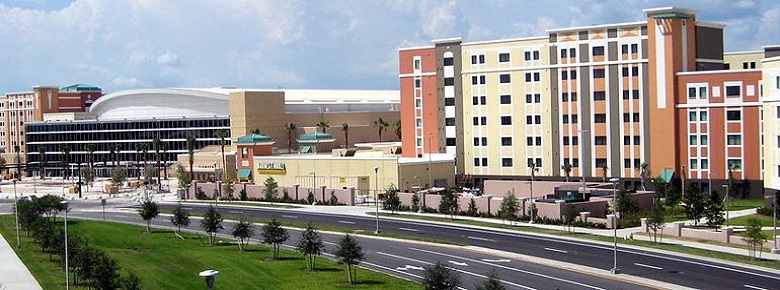
The Bachelor of Science in Social Sciences program from University of Central Florida is a 120 credit program that includes general education courses as well as courses in communication, social foundations, science foundations, and core concentration areas. Although the degree can be earned online, some electives are only available on campus.
The University of Central Florida is accredited by the Southern Association of Colleges and Schools Commission on Colleges.

University of Hawaii – West O’ahu offers several options for online social science degrees. In addition to bachelors and masters degrees in social work, there are also social science bachelors degrees in psychology, political science, and early childhood education. There’s also an interdisciplinary studies program in social sciences of oceans.
UH West Oʻahu is accredited by the Western Association of Schools and Colleges.
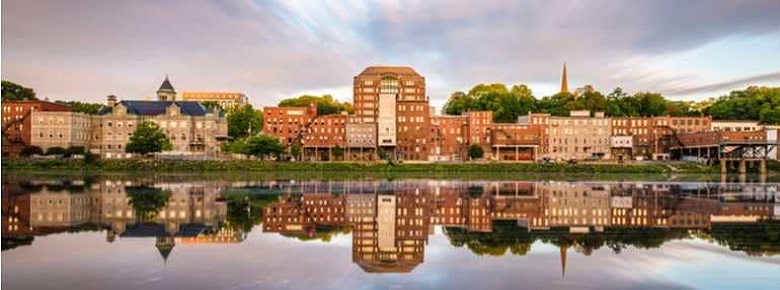
Students enrolled in the Bachelor of Arts in Social Science program at University of Maine at Augusta will learn about the ups and downs of political campaigning, why historical events happened as they did, everything involved in reducing and stopping crime, and many other social science-related topics of study.
The University of Maine at Augusta is accredited by the New England Commission of Higher Education.
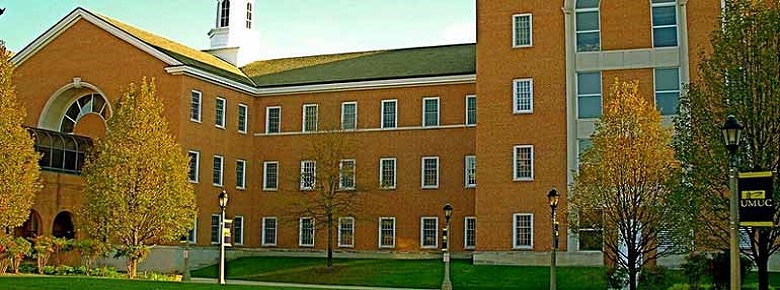
University of Maryland Global Campus’s Bachelor of Science in Social Science program is a fully online, 120 credit program. It teaches students to communicate effectively with others, analyze complex social problems, explain the factors linked to socialization and society, and integrate their own research findings into various social science disciplines.
The University of Maryland Global Campus is accredited by the Middle States Commission on Higher Education.

The University of Massachusetts Global offers a 120 credit Bachelor of Arts in Spatial Social Sciences program. It is designed to teach students how to examine and understand the relationships between people, their communities, the environment, and even the places they go using scientific and data analysis.
The general option provides them with a comprehensive overview and helps to prepare them for the CSET exam. The specialization option allows them to focus specifically on career and life planning or sociology.
University of Massachusetts – Global is accredited by the WSCUC Senior College and University Commission.

The Bachelor of Arts in Social Science Studies program at University of Nevada – Las Vegas teaches students to write and communicate effectively, conduct and present research, and identify the critical procedures in social science fields. Courses include interdisciplinary inquiry, two years of a foreign language, and a final capstone project.
The University of Nevada – Las Vegas is accredited by the Northwest Comission on Colleges and Universities.
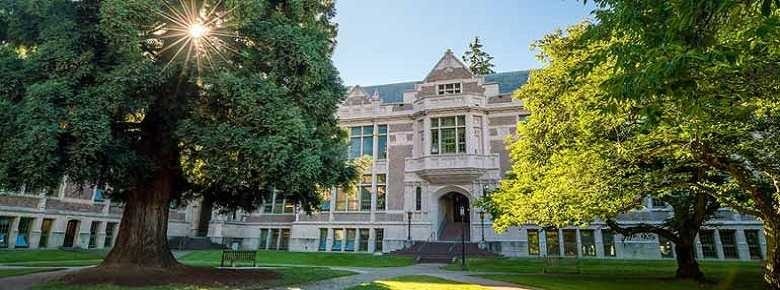
University of Washington’s social sciences bachelors program can be taken fully online by either part-time or full-time students. It’s an affordable program that’s designed for working professionals who need flexible schedules.
Popular courses include history of anthropology, race, gender and sexuality in the media, contemporary moral problems, and failed states.
The University of Washington is accredited by the Northwest Commission on Colleges and Universities.

Students in Virginia Wesleyan University’s Bachelor of Arts in Social Science program can choose from four concentration areas and earn their degrees quickly thanks to the school’s generous transfer policy. Students can potentially earn their degrees in only 1 year with a flexible program that’s focused on interdisciplinary discussion and learning.
Virginia Wesleyan University is accredited by the Southern Association of Colleges and Schools Commission on Colleges.
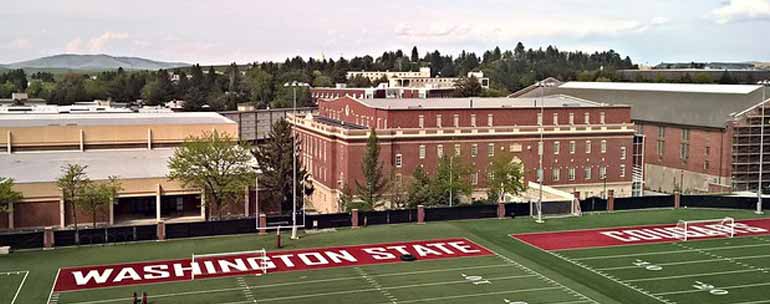
Washington State University’s Bachelor of Arts in Social Sciences program has three start dates each year.
There are 12 areas of concentration available, including harder-to-find ones like comparative ethnic studies, human development, and economic sciences. Students can select one concentration area or pursue a multidisciplinary degree with three concentrations.
WSU is accredited by the Northwest Commission on Colleges and Universities.
Getting Your Social Science Degree Online

In addition to earning a salary well above average, a degree in the field of social science may position you to help others and to have a positive impact on your community and beyond.
An online learning format may help you maintain any of your work, family, or community responsibilities while working toward your social science degree. Today’s colleges and universities offer amazing virtual learning platforms, and the same highly qualified faculty members who teach on-campus also tend to teach online.
If you’re intrigued by the idea of earning a bachelors degree in social sciences, you may consider researching accredited colleges to find the degree program and concentration that is the best fit for you.

